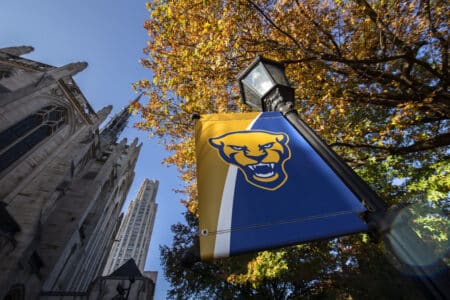There are several reasons why the University of Pittsburgh School of Education attracts graduate students from every corner of the globe. Prestige is one of them — the school is ranked #1 in Pennsylvania and #23 nationally within a renowned R-1 research institution
Here, aspiring educators from 19 countries across Africa, Asia, Europe, the Middle East, and the Americas are being guided by the motto “be the spark who ignites learning and inspires change,” learning to leverage their top-tier education as a powerful tool for societal transformation.
How they choose to make an impact is entirely up to them. With more than 50 degrees and certificates available, the School of Education caters to all unique aspirations and can equip anyone with the knowledge and skills needed to inspire others and reshape educational systems.
For instance, MA in Education Policy student Liying Cheng believes her programme gave her the tools to analyse the systems and structures behind education and improve learning opportunities for students of all ages. The MA has two tracks: Higher Education Policy and Comparative and International Education, with the latter concentration standing out for the many graduates it has prepared for work in ministries of education, research firms, and government agencies.
Cheng is set to join their ranks. “I plan to work in international education affairs,” she says. “The courses are making me familiar with the development of international education and the analytical methods for educational policies worldwide.”

MA in Education Policy student Liying Cheng is confident her Pitt Education degree set her up for success in the international education sector. Source: University of Pittsburgh
MEd in World and Heritage Language Education graduate Sunhanyan “Flora” Lu is already reaping the rewards of her Pitt education. Her hands-on, cutting-edge programme trains students to be foreign language teachers at private schools in the US or English teachers in their home countries. Two specialisations can be combined with the MEd degree: K-12 English as a Second Language (ESL) state endorsement and Teaching English as a Second Language (TESOL) certificate from Pitt.
“The curriculum was very appealing to me,” Lu says. “As someone who wants to become a foreign language teacher, I found the course very helpful both from the theoretical and practical aspects.”
Pick your Destination – and Pitt Education will help you get there
Students like Lu and Cheng are part of the generations of teachers, school leaders, policy makers, university researchers, clinical scientists, exercise physiologists, mental health professionals, and community leaders who all got their start at Pitt Education. Some go on to further study through the school’s Doctor of Education (EdD) programme, selected as the 2023 Programme of the Year by the Carnegie Project on the Education Doctorate (CPED).
Other popular master’s programmes include Early Childhood Education, Clinical Exercise Physiology, Curriculum and Instruction, Applied Behaviour Analysis and Higher Education. Additionally, the MS in Applied Developmental Psychology includes the latest scientific research in human psychology and equips graduates with the credentials needed to work in various settings, including schools, hospitals, nonprofits, and community health organisations.
It is yet another programme that offers students a wide variety of pathways, specialisations, and rich opportunities. Being part of a university with many options is crucial to a graduate student’s success. Not only does it allow them to align their programmes to their needs and aspirations, but it also allows students to study areas not found at many schools of education.
Such features are important to the academic success and engagement of international students. But they are by no means the only type of support Pitt Education provides.

Sunhanyan “Flora” Lu, a Master’s graduate in World and Heritage Education, found the programme’s blend of theory and practice highly beneficial in realising her goal of becoming a foreign language teacher. Source: University of Pittsburgh
Support at Pitt Education: From application through graduation — and beyond
International students experience unique challenges in adjusting to a new culture and country. They are away from family and friends, unfamiliar with different food and social customs, and learning a new language – all of which can cause anxiety, homesickness, and stress.
At the Pitt School of Education, faculty and staff have designed several initiatives to ensure their well-being from application through graduation — and beyond.
At the start of their Pitt Education journey, most international students benefit from the resources and services of the Office of International Services, which serves as the university’s immigration specialist. They help the 6,000 international students, scholars, staff, and faculty who call Pitt their academic home with all immigration issues smoothly, quickly, and correctly.
Whether it’s immigration documents, legal questions, pre-arrival information, and new student orientation, these experts on F-1 visas, J-1 visas, and any other visa status are ready to support before, during, and after an international student’s time at Pitt.
One OIS programme, Experience America, helps scholars, graduate students, and their families adjust to life in the US and learn more about the Pittsburgh area. Its Fall 2024 Lunch and Learn sessions cover topics like American football, US elections, health resources and insurance, and the history of Pittsburgh, which is one of the safest, most liveable cities in the US. Those who can’t make it in person can watch the OIS Online Presentations, videos with information on how to use OIS services, getting around Pittsburgh, immigration benefits, and important information about the University of Pittsburgh.
Many students report that the greatest part about being an international student at Pitt is its friendly campus community. According to research, the best way to adjust to life at university is by establishing social networks with the campus community.
Throughout the year, the Pitt School of Education’s student-run International Student Peer Network hosts various social events including welcome parties, cultural and sight-seeing visits, and food/coffee break outings. Where better to host all of this but in the cosmopolitan city of Pittsburgh, a melting pot of cultures and lifestyles with 90 vibrant neighbourhoods?
When it’s time to graduate, some Pitt Education students choose to stay in the US, while others return to their home countries, enriching their communities with their newfound knowledge. Regardless of their path, they have a lifetime of memories, friends for life, and an alumni network of 32,000 individuals across 87 countries ready to open more doors for a fellow Pitt alum.
Explore the university’s international student guidelines for admissions to learn how you can apply in 2025 or 2026.
Follow the University of Pittsburgh on X, Instagram, Facebook and YouTube.












